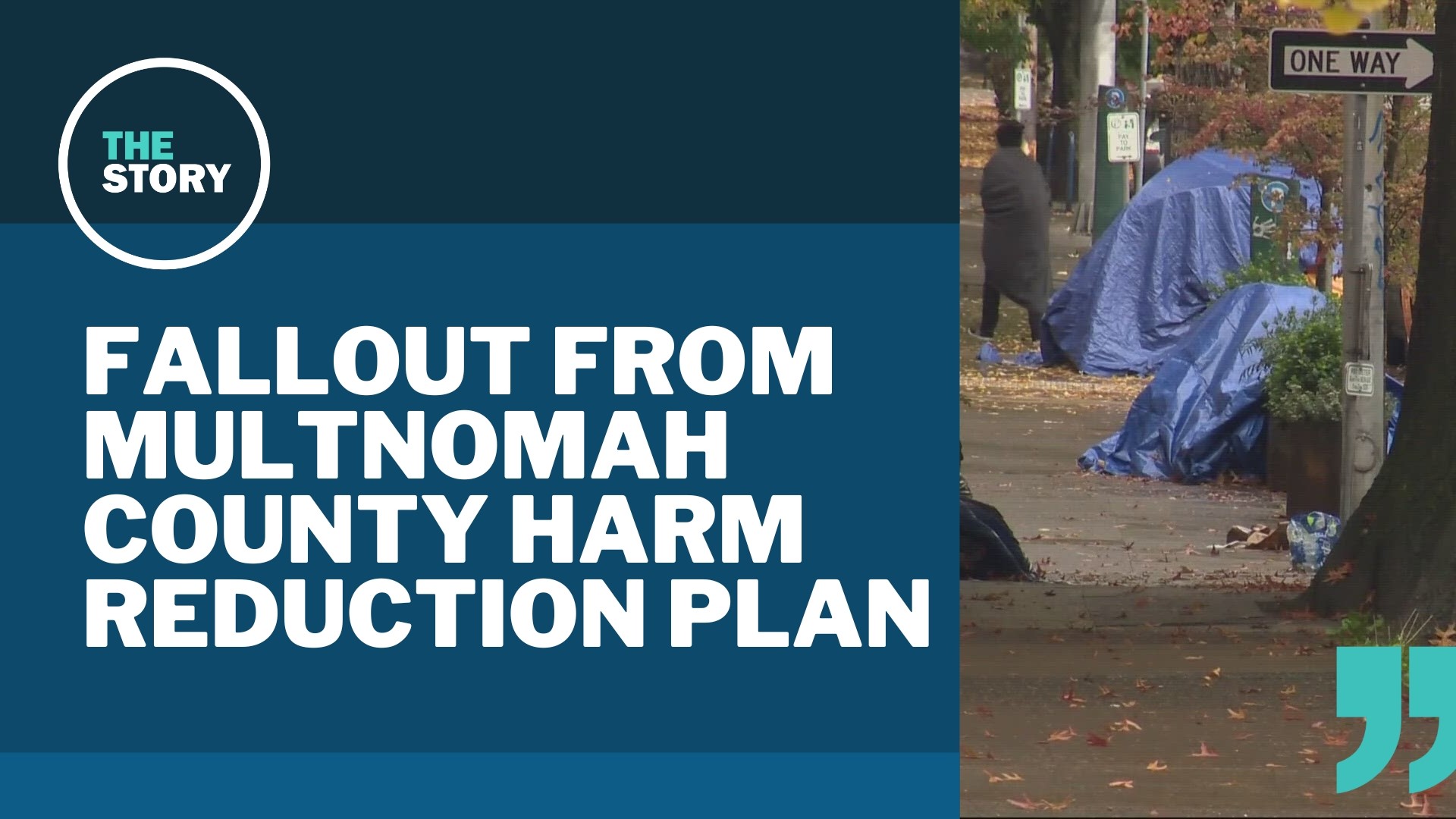PORTLAND, Ore. — Fallout from the Multnomah County Health Department's now-suspended plan to distribute fentanyl "smoking supplies" through its harm reduction program continued on Tuesday, bringing in a letter from a Portland attorney urging the city to break off its 7-year homelessness partnership with Multnomah County.
John DiLorenzo, Jr., of the law firm Davis Wright Tremaine LLP, represented a group of 10 people with disabilities who sued the city of Portland last September, alleging that the city violated the Americans with Disabilities Act by failing to clear homeless camps from public sidewalks.
Portland and the plaintiffs reached a settlement in May, with the city pledging to be more responsive in clearing camps that block public rights of way, as well as agreeing to quotas for clearing at least 500 campsites obstructing sidewalks each year, among other promises.
But according to a letter to city leaders that DiLorenzo publicly released Tuesday, Portland should now back out of its partnership with Multnomah County on the Joint Office of Homeless Services.
DiLorenzo hearkened back to a discovery last fall that the county had distributed $2 million in supplies to homeless people, including thousands of tents and tarps.
"When we discovered how the County had through its nonprofit partners blocked the sidewalks (only to have the City have to expend millions of dollars to remove them), we didn’t know whether to laugh or cry," the attorney wrote.
The last straw, DiLorenzo indicated, was the county health department's recent harm reduction plan.
"Up until Monday, the County staff were up to it again, preparing to distribute tin foil, straws and other drug paraphernalia to fentanyl addicts to further enable their habits," he continued. "This ill-conceived plan would not only have had disastrous policy implications for our homeless population, it would have presented clear and present dangers to those who must wheel through the piles of fentanyl-laced debris which would surely be abandoned on our streets in large quantities."
Here, DiLorenzo made the claim that fentanyl is "so toxic, even small exposures can have significant adverse health impacts on those whose hands come in contact with these toxic materials."
Claims like these have come up repeatedly since fentanyl started becoming more common as a street drug, but health experts tend to push back against that characterization. While certainly an incredibly powerful synthetic opioid, second-hand fentanyl exposure — either through smoke or skin contact — is considered relatively low-risk since the drug is primarily absorbed through mucus membranes.
RELATED: Secondhand exposure to fentanyl unlikely to cause harmful health effects, medical experts say
Regardless, DiLorenzo cited the aborted harm reduction program as another reason why the city should exercise its right to dissolve JOHS by providing a 60-day notice, or by simply ceasing its payments into the office.
"It is such a departure from City policy, and is such a threat to the safety of the community, that we believe it warrants the City suspending all further quarterly payments, dissolving the JOHS, and proceeding against Multnomah County to enforce its indemnity obligation to recover the City’s costs of defense of the Tozer litigation, (including any attorney fees awarded to the plaintiffs by the Federal Court)," DiLorenzo said in summation. "You have given the County staff more than enough time to get on the same page. It is apparent that they will continue to pursue their disastrous course unless you take a bold step. Dissolving the Joint Office should be that step."
It's worth noting that, though they both exist under the Multnomah County umbrella, the Joint Office of Homeless Services and the health department are separate entities — JOHS does not run the county's harm reduction program.
RELATED: Portland drug users are getting free supplies, whether Multnomah County distributes them or not
In response to a request for comment, Multnomah County released a statement attributed to JOHS Director Dan Field:
"The extension of the Joint Office is a done deal – both the City and the County recently agreed to move forward with a 12-month extension. The Joint Office’s relationship with the City is on the upswing, and we are working every day to increase our coordination and alignment to solve homelessness in our region.
"In just the past few months, we've doubled down on our close cooperation around new temporary alternative shelter sites, additional safe rest villages, an expanded Clean Start program to increase trash removal, and our work with the State to house individuals now sleeping at the foot of the Steel Bridge.
"Mr. DiLorenzo is raising this issue in an attempt to recoup attorney’s fees for his recent ADA lawsuit – he wants Multnomah County taxpayers to foot the bill. We're focused on leaning in to move the work forward and encourage others to do the same."
While Mayor Ted Wheeler and Commissioner Rene Gonzalez were both vocal in their opposition to the Multnomah County Health Department's harm reduction moves, the city of Portland did not immediately respond to a request for comment on DiLorenzo's letter.
Several Portland commissioners signaled earlier this year that they'd soured on the contract under which Portland and Multnomah County operate JOHS, complaining that the city does not have enough influence over how the office is operated. While the office gets funding from the city to the tune of $40 million per year, it's essentially run as a division of the county. Portland's funding accounts for about 15% of the estimated $265.5 million JOHS budget over the coming year.
The reason for the lopsided arrangement at JOHS, County Chair Jessica Vega Pederson recently told KGW, is that Multnomah County has historically shouldered social services for the greater Portland area, while the city handles economic development and utilities.

